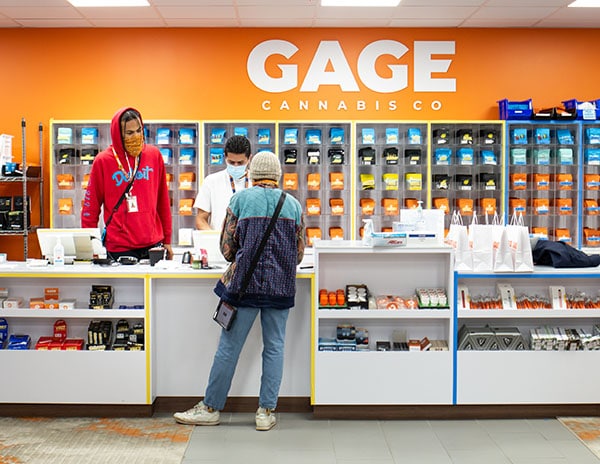Gage Growth is a triple, says PI Financial

 New pubco Gage Growth (Gage Growth Stock Quote, Chart, News, Analysts, Financials CSE:GAGE) received lots of praise from PI Financial analyst Jason Zandberg in a coverage initiation on Wednesday. Zandberg said Gage’s focus on the hot Michigan cannabis market along with its quality retail network and exclusive brand partnerships are all pluses for this attractive single-state US cannabis operator.
New pubco Gage Growth (Gage Growth Stock Quote, Chart, News, Analysts, Financials CSE:GAGE) received lots of praise from PI Financial analyst Jason Zandberg in a coverage initiation on Wednesday. Zandberg said Gage’s focus on the hot Michigan cannabis market along with its quality retail network and exclusive brand partnerships are all pluses for this attractive single-state US cannabis operator.
Detroit-headquartered Gage Growth, which began trading on the Canadian Securities Exchange on April 6, 2021, currently operates nine dispensaries across the state of Michigan, has three owned cultivation facilities and agreements with six growers to cultivate their proprietary cannabis strains. The company has licenses to open five more stores, while seven of its currently-open dispensaries are under the Gage brand and two are Cookies branded.
In 2019, Gage signed an agreement with Cookies, one of the most recognized and popular cannabis and lifestyle brands in the US, to be its exclusive partner in Michigan and have licensed the Cookies brand for use in manufacturing, cultivation and retail, paying Cookies a five-per-cent royalty on all products sold in either its Gage stores or Cookies stores. One of Gage’s two Cookies locations is the top medical dispensary in the state (in Detroit) while the other is the first adult-use Cookies store in the Midwest in Kalamazoo.
Gage is planning on opening another two Cookies locations by the end of this year, with the company having announced its aim to hit 20 stores in total by year’s end.
Zandberg said Gage should be able to find attractive tuck-in acquisition targets from small single-location operators in Michigan’s fragmented cannabis market.
“The Michigan cannabis market is extremely competitive because of the experienced consumers and the licensing structure that is less restrictive compared to other limited license states. Despite Michigan’s size and growth profile, the state has largely been ignored by the MSOs who favour the more restrictive, limited license states,” Zandberg said in his report.
Zandberg said the Michigan market, with a population of about ten million, has about 250,000 registered medical cannabis patients and now the third-highest cannabis sales out of all the markets in the United States.
On Gage’s retail strengths, Zandberg noted that the company’s average basket size in 2020 was nearly double the state average at $164 compared to the state average of $85. Along with Cookies, Gage has exclusive licenses to produce and distribute the SLANG product suite in Michigan as well as Blue River and Lemonnade branded products. Over the first quarter, 2021, Gage’s average monthly retail sales across all of it stores (excluding one in a tourist area that was heavily impacted by COVID-19) was about $1.1 million, according to Zandberg, with four of its stores currently operating in excess of a $15-million run-rate.
“Gage maintains a consistent and premium retail brand that is recognized by consumers across the state. Their retail locations and product selection are carefully crafted to optimize customer experience, enabling them to consistently command premium pricing because of the brands reputation for quality. Gage’s current portfolio of dispensaries covers 90 per cent of the state’s population within a one-hour drive,” Zandberg wrote.
“The exclusive partnerships with brands that are in high-demand fortify Gage’s competitive advantage in Michigan. The partnerships contribute to the Company’s high average basket size and enable them to charge premium prices,” he said.
Looking ahead and commenting on Gage’s stated goal of reaching 20 stores in 2021, Zandberg is staying more conservative with his forecast, calling for Gage to hit 16 stores by the year’s end, 21 by the end of the first half of 2022 and 27 by the end of 2022, with Zandberg saying Michigan’s regulatory authority is extraordinarily slow in licensing.
As for production, Zandberg said Gage is currently selling out of all of its product at its own stores and is not selling into the wholesale market. At the same time, the analyst said management has indicated that once cultivation capacity gets above its network needs, Gage will start selling into the wholesale market, with Zandberg forecasting revenue to come in the second half of 2022.
At the end of April, Gage reported its fiscal 2020 year-end results, which saw full year revenue grow by 1,972 per cent to $39.9 million, while the fourth quarter revenue rose by 615 per cent year-over-year to $10.5 million. The full 2020 net loss was $29.8 million. Management also provided 2022 Q1 and Q2 guidance with revenue expected to hit $17-18 million in the Q1 and $26-31 million in the Q2, while flower gross margin was forecasted at between 40-45 per cent for the Q1 and 45-50 per cent for the Q2. (All figures in US dollars except where noted otherwise.)
For his part, Zandberg is calling for Gage to generate 2021 and 2022 revenue of $141 million and $306 million, respectively, and 2021 and 2022 adjusted EBITDA of $9 million and $93 million, respectively.
“We believe there is strong upside potential in GAGE shares given our bullish outlook on the Michigan cannabis market, Gage’s quality retail network and its exclusive partnerships with top brands such as Cookies, Lemonnade, Slang and Blue River,” Zandberg wrote.
The analyst initiated coverage of GAGE with a “Buy” rating and C$7.50 target price, which at press time represented a projected one-year return of 199 per cent.



